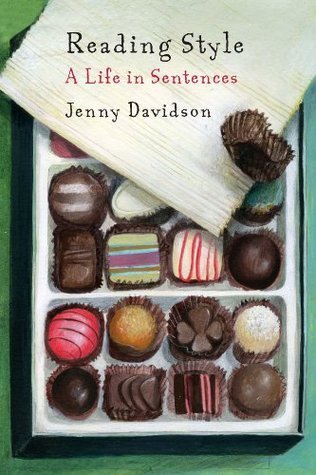A salute to sentences
 [Bookshop in Edinburgh, Scotland. Taken by Richard Gilbert, Summer 2012.]
[Bookshop in Edinburgh, Scotland. Taken by Richard Gilbert, Summer 2012.]English professor’s bonbon delightfully blends criticism & memoir.
Reading Style: A Life in Sentences by Jenny Davidson
Guest Review by Lanie Tankard
Long before the idea of a writer’s conference was a glimmer in anyone’s eye, writers learned by reading the work of their predecessors. They studied meter with Ovid, plot construction with Homer, comedy with Aristophanes; they honed their prose style by absorbing the lucid sentences of Montaigne and Samuel Johnson.
—Francine Prose, “Close Reading” (The Atlantic)
Jenny Davidson loves to read. In fact, she’s spent her entire life immersed in words as a professional reader. A professor of English and Comparative Literature at Columbia University, Davidson has written four novels and two academic works. Her blog is called “Light Reading.”
In a new book, Reading Style: A Life in Sentences, she explores literature while weaving together vignettes from her two worlds of reader and critic. She likens the reading habit to a compulsion or an addiction. For fellow reading addicts, she suggests keeping a field notebook, as an ornithologist might on bird sightings, to record those sentences that “glimmer.”
Davidson debunks the “self-improvement” motive to read, calling reading “a form of intellectual play” rather than a lesson. She boils it down to the “details of language” and states firmly: “All sentences are not created equal.” She labels sentences “verbal artifacts,” believing style is everything. A person’s temperament can be discerned by sentences written, she says, adding, “a sentence is the key to the heart.” She confesses she was a “word child.”
While weighing the merits of a comma versus a colon or semicolon, she champions the comma for being less judgmental—but loathes the Oxford comma.
Perusing words on a page has transported her to other worlds. She leads the reader through qualities such as pacing and timing in a series of examples from a mix of eras: Neil Gaiman, Jane Austen, Stephen King, George Eliot, Homer, Jonathan Lethem, Montaigne, Helen DeWitt, Samuel Johnson, and others.
She shows how certain writers can “embed the future in the past.” Some books resemble their writers’ minds, she believes, and demonstrates the role of lists in writing while discussing the memoir of Roland Barthes.
Which book transformed her sense of what could be done in language, and which novel did she hate? She divulges those titles, yet stresses her goal is to guide the reader in how to read, not what. She does include “A Reading List” at the end though.
When Davidson discusses the genealogy of contemporary novels, she examines the “cross-pollination” of two lines of style stemming from Henry James and Marcel Proust. She offers thoughtful tidbits, such as the “late” style of James being attributed to his habit of dictating rather than writing by hand, thus creating an oral form. Not all her examples are from fiction, as she draws from Svetlana Alexievich’s Voices from Chernobyl: The Oral History of a Nuclear Disaster in deliberating a writer’s role enabling acts of witness as opposed to the creation of beautiful sentences.
[Jenny Davidson.]
Davidson quotes extensively from various works to illustrate her points. At times it was hard to tell just where the quoted material ended and her own thoughts took up again, which is more a design issue than the fault of the author.Reading Style is a collection of lectures from a course Davidson taught called “On Style.” Consequently, some of the sections are aimed at scholars, but others are rich with heartfelt reminiscences of pages turned and sentences consumed. In mixing both academic and lay insights, she creates an interesting mashup of genres—literary criticism with memoir.
Davidson likens her book to a box of chocolates, which the cover art illustrates. She offers readers a sampling of the sentences she has loved in her reading life. She looks for their “chewy” quality experienced through both mouth and ear. She herself prefers “words grounded in the mouth.”
Indeed, like a box of chocolates, there’s a little something for everyone in this book.

[Lanie Tankard.]
Lanie Tankard is a freelance writer and editor in Austin, Texas. A member of the National Book Critics Circle and former production editor of Contemporary Psychology: A Journal of Reviews, she has also been an editorial writer for the Florida Times-Union in Jacksonville.


![[Jenny Davidson.]](https://i.gr-assets.com/images/S/compressed.photo.goodreads.com/hostedimages/1404511548i/10249957.jpg)


